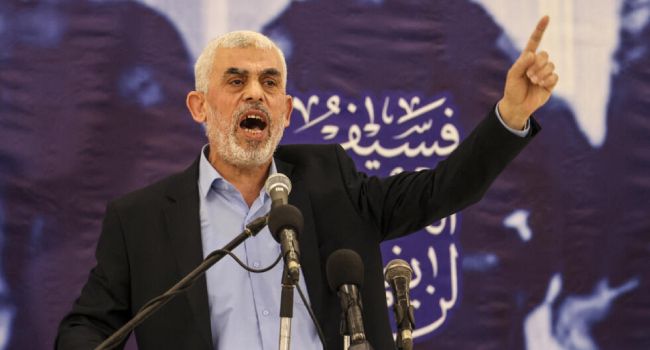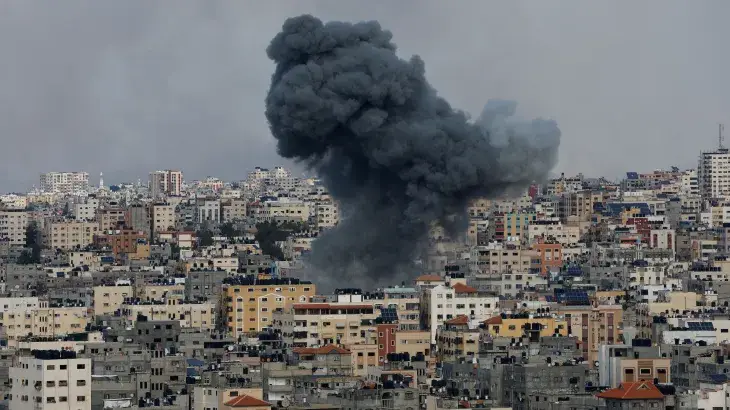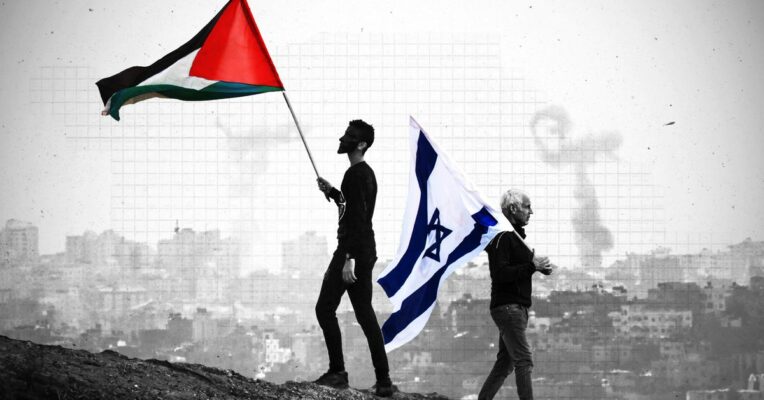
Israel announced on Thursday the killing of Hamas chief Yahya
Sinwar, mastermind of the October 7 attack, calling his death a “heavy blow” to the Palestinian group it has been fighting for more than a year.
The Israeli military said that “after a year-long pursuit”, troops “eliminated Yahya Sinwar, the leader of the Hamas terrorist organisation, in an operation in the southern Gaza Strip” on Wednesday.
Hamas has not confirmed his death.
People dance and wave Israeli national flags as they celebrate the news of the death of Hamas leader Yahya Sinwar, in Jerusalem on October 17, 2024. (Photo by Menahem KAHANA / AFP)
“Today evil has suffered a heavy blow,” said Israeli Prime Minister Benjamin Netanyahu.
While the war was “not over yet”, Netanyahu said Sinwar’s death was an “important landmark in the decline of the evil rule of Hamas”.
Israeli Foreign Minister Israel Katz said in a statement that Sinwar was a “mass murderer… responsible for the massacre and atrocities of October 7”, while President Isaac Herzog hailed the killing of the militant leader behind “heinous acts of terrorism”.
Israel accuses Sinwar of masterminding the deadliest attack in Israeli history, and had been hunting him down since the start of the Gaza war.
He rose through the ranks of the Palestinian militant group to become first its leader in Gaza, then its overall head after the killing in July of political chief Ismail Haniyeh.
Israel’s announcement on Sinwar comes weeks after it assassinated Hezbollah chief Hassan Nasrallah in a massive strike in Lebanon, where the Israeli military has been at war since late September.
ADVERTISEMENT
A slew of other Iran-backed militant commanders have also been killed in recent months.
With Hamas massively weakened more than a year into the Gaza war, Sinwar’s death could deal a seismic blow to the organisation.
US President Joe Biden, whose government is Israel’s top arms provider, said: “This is a good day for Israel, for the United States, and for the world.”
“There is now the opportunity for a ‘day after’ in Gaza without Hamas in power, and for a political settlement that provides a better future for Israelis and Palestinians alike.”
Calls for hostage release
Israeli military chief Herzi Halevi said that “we are settling the score with Sinwar, who is responsible for that very difficult day a year ago”, vowing to keep fighting “until we capture all the terrorists involved in the October 7 massacre and bring all the hostages home”.
Israel’s Katz said Sinwar’s death could “lead to a new reality in Gaza, one that is without Hamas”.
The Israeli military earlier said it was checking whether Sinwar was one of three militants killed in an operation in Gaza, with an Israeli security official telling AFP that a DNA test was conducted.
Israel has been at war with Hamas since the October 7 attack, which resulted in the deaths of 1,206 people, mostly civilians, according to an AFP tally of official Israeli figures.
Israel’s retaliatory campaign in Gaza has killed 42,438 people, the majority civilians, according to data from the health ministry in the Hamas-run territory, which the UN considers reliable.
Following the attack, Netanyahu vowed to crush Hamas and bring home all 251 hostages seized by militants in their cross-border onslaught. Ninety-seven remain in Gaza, including 34 Israeli officials say are dead.
Israeli military historian Guy Aviad, a Hamas expert, said Sinwar’s killing was “a significant event… but it’s not the end of the war” in either Gaza or Lebanon.
The “Hamas movement still rules the Gaza Strip” and its militants may still harm Israeli hostages who are in “grave danger”, Aviad told AFP.
Campaign group the Hostages and Missing Families Forum urged the Israeli government and international mediators to leverage “this major achievement to secure hostages’ return”.
French President Emmanuel Macron and German Foreign Minister Annalena Baerbock separately called on Hamas to release all hostages.
Netanyahu, in a video statement, also said Palestinian militants should free the hostages if they want to live.
“Whoever lays down his weapon and returns our hostages — we will allow him to go on living,” he said.
Multi-front fighting
Israel has expanded the scope of its operations to Lebanon, where Hamas ally Hezbollah opened a front against Israel by launching low-intensity cross-border strikes that forced tens of thousands of Israelis to flee their homes.
Israel on Thursday launched strikes on the south Lebanese city of Tyre, where the militant group and its allies hold sway.
The military said five soldiers were killed in combat in southern Lebanon, taking to 19 the number of troop deaths announced since Israel began raids into Lebanon last month.
In Lebanon, the war since late September has left at least 1,373 people dead, according to an AFP tally of Lebanese health ministry figures, though the real toll is likely higher.
Israel also issued evacuation warnings for civilians in parts of Lebanon’s eastern Bekaa Valley, a Hezbollah stronghold, where the official National News Agency reported strikes late Thursday.
The war has drawn in other Iran-aligned armed groups, while Tehran on October 1 conducted a missile strike on Israel. Israel has vowed to retaliate, sparking concern that what is already a war on multiple fronts could morph into an all-out regional conflict.
In northern Gaza’s Jabalia, two hospitals said Israeli air strikes on a school sheltering displaced people killed at least 14 people.
The military reported that it had hit militants.
As Israel has intensified operations in northern Gaza and issued new evacuation orders, UN human rights chief Volker Turk on Thursday warned that any “large-scale forcible transfer” could constitute a war crime.
Some 345,000 Gazans face “catastrophic” levels of hunger this winter after aid deliveries fell, a UN-backed assessment said.
Nearly 100 percent of Gaza’s population now lives in poverty, the UN’s International Labour Organization said, warning that the war’s impact on Gaza “will be felt for generations to come”.
AFP


